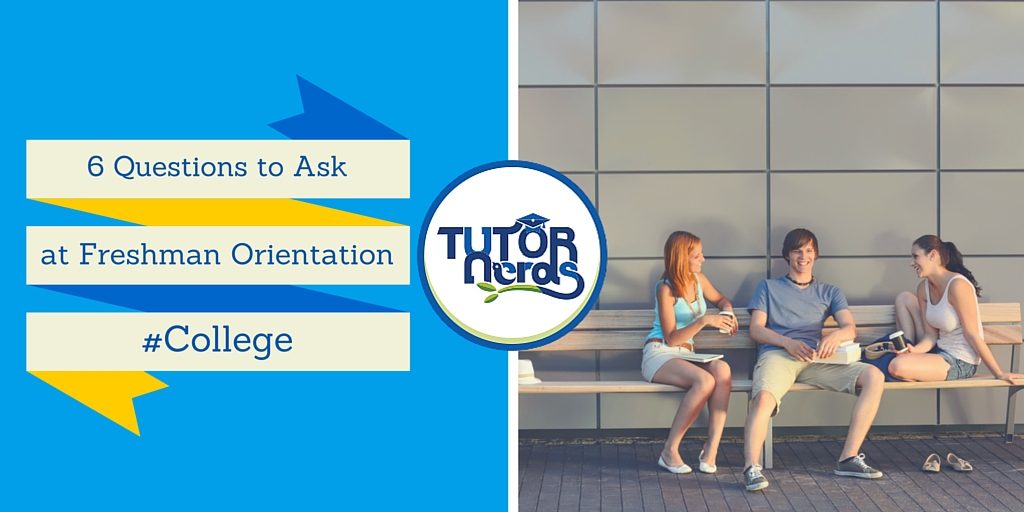6 Questions to Ask at Freshman Orientation



Recent high school graduates will undoubtedly be excited to attend their freshman orientation at the college of their choice. All of this information in conjunction with a recent graduation can become overwhelming rather quickly. However, it’s really important for students to ask the right questions and gain valuable information that can make their first year easier. Also, students are encouraged to take advantage of the social aspect of freshman orientation by getting to know potential classmates, roommates, and teaching staff. It’s also a great idea to write down some of these crucial questions to avoid forgetting something at the last minute.
The first thing a freshman needs to think about is whether or not they will need to take prerequisite courses. In many cases, students need to take one course before they are accepted into another. Examples include English 1A and 1B or Chemistry 101 and Chemistry 102. It’s important for students to know that they cannot sign up for the second course before they take the first course. Students who fail to take the prerequisite during the fall term will have to wait an entire year before they can sign up for it again. During orientation, new students are strongly encouraged to learn about prerequisites in general (READ: 5 ways to learn about art this summer).
Some universities offer a freshman package meaning that new students are automatically enrolled in four courses that fulfill general education requirements. This can be beneficial because students don’t have to worry about signing up for individual classes or getting a specific time or day that might already be full. On the other hand, if students have already chosen their major field of study a package deal might not work. It’s best for students to ask about this before the day they register for classes so they can make an informed decision. Students who sign up for courses individually will need to make sure they have a first and second choice in case they get locked out of their original course.
Nearly every college freshman will be locked out of at least one of the courses they need to take. When this happens, the students can either take a second or third choice course that fulfills the same requirement or waits to take that course until the next term. Students who are overly choosy may find that it takes them five or six years to earn a four-year degree, so it’s better to have alternate choices prepared ahead of time. It can be very frustrating to be locked out of a course, but students should rest assured that this happens to most people, and it works out in the end.
Another thing students should focus on is where they will be living about their classes. This can help them plan their schedule as well as their social activities. In many cases, the dorms will be located on the opposite side of campus. This means students will have to plan ahead of time to either walk or bike across campus. Students should also have a plan for getting home at night and for any social activities that occur throughout the week (READ: 5 Reasons to get an in-home Irvine tutor this summer).
Nearly every university has some social activities planned specifically for freshmen. This will give new students an opportunity to meet one another, make new friends, and work on general social networking. However, if students miss these activities, they might find that they’re a little late to the game when it comes to socialization. Get a list of these activities straight away and attend as many of them as possible.
Almost everyone will forget to ask one or two important questions at orientation. It’s important to get a business card or the contact information of one or two people who work for the University who can answer questions later on. If possible, get a direct number or an extension for somebody rather than the front office number, which requires countless menu options and sends callers to a voicemail box.
Make sure you’re caught up and prepared for university with the help of an Irvine college tutor. Call us today for more information.

100% Satisfaction Guarantee
You’ll love your tutor, or you don’t pay.

We will evaluate your situation and answer any questions. We will then individually match you with one of our tutors. Your tutor will recommend the best strategies for you based on your goals. You’ll work with the same tutor ongoing and you can schedule directly with your tutor.
100% Satisfaction Guarantee – You’ll love your tutor, or you don’t pay
| Cookie | Duration | Description |
|---|---|---|
| cookielawinfo-checkbox-analytics | 11 months | This cookie is set by GDPR Cookie Consent plugin. The cookie is used to store the user consent for the cookies in the category "Analytics". |
| cookielawinfo-checkbox-functional | 11 months | The cookie is set by GDPR cookie consent to record the user consent for the cookies in the category "Functional". |
| cookielawinfo-checkbox-necessary | 11 months | This cookie is set by GDPR Cookie Consent plugin. The cookies is used to store the user consent for the cookies in the category "Necessary". |
| cookielawinfo-checkbox-others | 11 months | This cookie is set by GDPR Cookie Consent plugin. The cookie is used to store the user consent for the cookies in the category "Other. |
| cookielawinfo-checkbox-performance | 11 months | This cookie is set by GDPR Cookie Consent plugin. The cookie is used to store the user consent for the cookies in the category "Performance". |
| viewed_cookie_policy | 11 months | The cookie is set by the GDPR Cookie Consent plugin and is used to store whether or not user has consented to the use of cookies. It does not store any personal data. |